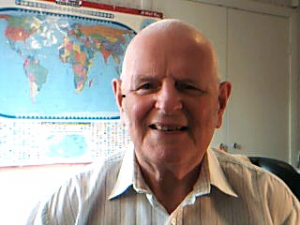- Introduction
 My name is Keith Boss and I am from the United Kingdom. I am the current Chair of the International Stuttering Association (ISA) and will pass on the post in July 2016 when I will have served the maximum of 9 years on the Board of Directors of the ISA. The majority of the Board are People Who Stutter (PWS) and the majority of the ISA Advisory Board members are Speech and Language Pathologists (SLPs). The picture of the cat and dog reminds me that friendship and trust can cross all kinds of diverse skills and experience. When there is a belief that there is a good way forward then, with good will and trust, that way will be found.
My name is Keith Boss and I am from the United Kingdom. I am the current Chair of the International Stuttering Association (ISA) and will pass on the post in July 2016 when I will have served the maximum of 9 years on the Board of Directors of the ISA. The majority of the Board are People Who Stutter (PWS) and the majority of the ISA Advisory Board members are Speech and Language Pathologists (SLPs). The picture of the cat and dog reminds me that friendship and trust can cross all kinds of diverse skills and experience. When there is a belief that there is a good way forward then, with good will and trust, that way will be found.
The ISA vision is: A world that understands stuttering, and the ISA mission is to improve the conditions of all those whose lives are affected by stuttering in all countries by education, cooperation and communication.
The ISA represents national member associations, who in turn represent mainly PWS around the world. The IFA represents mainly SLPs/Speech and Language Therapists (SLTs) around the world. The common thread is stuttering. The ISA has a wealth of experience of stuttering and the IFA has an increasing expertise in useful therapies, which go beyond stuttering word counts and include work on our thoughts, feelings, emotions and how we interpret events. For example, use of CBT / ACT / Mindfulness / helps us to ask ourselves why we placed an interpretation on a particular event and was that interpretation resourceful in helping us to achieve what we want to achieve. A closer working relationship with the IFA and its members may result in increasing the level of expertise in all speech and language professionals and in Self Help Groups (SHGs) around the world.
This paper gives an idea of how the ISA helps those requesting help where no organised SLP/SLT help is available.
- What have we done?
 This picture reminds me that our work is always ‘Work in Progress’ and will only be completed when there are no longer requests for our help.
This picture reminds me that our work is always ‘Work in Progress’ and will only be completed when there are no longer requests for our help.
We have:
- Provided non-judgmental support both via internet and physical presence;
- Shared information and experiences both via internet and physical presence;
- Initiated the working of ISP-S (International Speech Project- Stuttering) teams in Africa;
- Set up a website (isastutter.org), One Voice and e-newsflashes to provide information and experiences;
- Hosted annual on-line conferences, October 1st to October 22nd to help PWS and trainee therapists as well as SLPs, SLTs, family members, friends and colleagues; See https://isad.live/
- Initiated and support ISAD (International Stuttering Awareness Day) on the 22nd October;
- Enabled some SLPs to give additional training to some SLPs in Africa;
- Initiated Project Africa; See http://www.isastutter.org/outreach-africa
- Co-hosted 10 World Congresses and assisted in full or partial funding for some participants; See http://www.isastutter.org/what-we-do/world-congress
- A growing working link with the IFA for more joint ventures.
- What should we do?
 Everything begins with a thought. Without thought there is no focus and without focus and action, nothing will be achieved. So, we think; focus; take action; evaluate the action and continue until finished or restart with different action.
Everything begins with a thought. Without thought there is no focus and without focus and action, nothing will be achieved. So, we think; focus; take action; evaluate the action and continue until finished or restart with different action.
The first thoughts about what the ISA should do are:-
- More of the same;
- We need to introduce clarity in information about us, the ISA, so that funding agencies are attracted;
- We need to seek funding to increase ‘more of the same’;
- We need to seek more volunteer support and make better use of it;
- We need to support the IFA to help therapists to research and provide good ways to identify, in a short space of time, children who need Primary Therapy;
- We need to make very clear to each PWS that, based on suggestions from others, including SLPs, THEY themselves can take charge of their stuttering and to research and decide on their own way ahead. They can create their own plan for their own future;
- We need to encourage the growth in the number and expertise of SHGs and stuttering associations and the growth of ‘hangouts’ where PWS listen and talk;
- We need to encourage SHGs to be outward looking and see how they can help others in the community;
- Together with the IFA, we need to link with African (and other) Universities to encourage the initiation of an anti stigma campaign in local and national media; to encourage the creation of more and more SHGs; to promote SLP training courses: to encourage the use of their IT equipment for teletherapy (until local SLPs are trained);
- We need to seek to expand our membership worldwide; to help to expand the size of SHGs; to help to expand the number of SHGs; to help to expand the number of countries holding national meetings; to seek to be more effective in the 150 or so countries where little or no organised help exists;
- More contacts with our membership,
- Use of paid part time staff and generally be more proactive around the world.
- What are we doing?
 This picture reminds me of some of the difficulties which need to be addressed when email or the written word is used for communication. Based on her skill set the cow is asking the wrong question to a snowy bystander. One thinks of chalk and cheese or “Tell us where you have hidden the cure for stuttering?”
This picture reminds me of some of the difficulties which need to be addressed when email or the written word is used for communication. Based on her skill set the cow is asking the wrong question to a snowy bystander. One thinks of chalk and cheese or “Tell us where you have hidden the cure for stuttering?”
It would be superb if SLPs and PWS were on the same page most of the time. How do we achieve that? One possible way is if the professional and client both set a good forward-looking goal.
E.G. Better communication day by day.
Concentration on body language and tone is a very important 93% of communication and can be practiced in SHGs and anywhere. Body language is 55% of communication and there is a direct link between body language and what we are thinking / feeling. Change one, and the other changes immediately.
As regards the work we do, there is:-
- Project Africa, which covers most of the work we do.
- Using an expansion of the concepts of ISP-S (International Speech Project-Stuttering),
we link with Universities in under-served countries, and use the media, to address general stuttering stigma in Universities / schools / employers and the public. We also encourage Universities to be a source for Internet therapy from trainee SLPs, supervised by their professors, and start SLP/SLT training programs where needed. - We work with any local professionals or agencies, in the same country, to help children who stutter (CWS).
- We help PWS, in under-served countries, to help themselves to start SHGs or expand the size, expertise and numbers of SHGs.
- We encourage SHGs to concentrate on Body Language and Tone, which are 93% of communication. This gives a very good forwards focus. We encourage them to look at their thoughts, feelings and how they interpret events….. many SLPs/SLTs are doing this more and more. We encourage them have fun and be outward looking to see how they can help others with different disabilities. Initially there may be high dependency on the ISA, however we encourage less and less dependency so move to guidance only, then just occasional assistance and then independence…this is the Capacity Building Model.
- There are a variety of requests of help from many countries dealt with via Outreach. There were 11 contacts from April to June only. They were from Gaza; Argentina; Japan; Bulgaria; an American in Spain; Ivory Coast; Korea; Iran; a Greek family living in France; Pakistan and Ethiopia.
- I mentioned ISP-S work above. The objectives of the ISP-S teams are
- Sensitise the general public;
- Explain about stuttering to a range of Government ministers, civil servants, health professionals, large companies, police, media, Universities and schools;
- Talk with parents of CWS;
- Talk to as many school teachers at as many schools as possible;
- Explain the self-help concept in use around the world;
- Help PWS to set up, or set up more, SHGs;
- After at least one SHG is set up, provide ideas for some members to go outside the SHG and help other PWS in a nearby villages / towns or cities to start more SHGs;
- If not in place, discuss setting up a national stuttering association with a website or web area on the ISA website;
- Provide local speech professionals with current methodologies for the full range of general speech therapy services in use elsewhere in the world;
- Request that this training is passed onto other speech professionals in the country;
- Request they encourage clients to form new SHGs;
- Provide PWS with education when time allows;
- Hold many meetings, then area conferences, then national conferences and International conferences.
(An SHG is the same concept as a Chapter (used in America).)
- Main Projects and Goals in Under-served Countries
 To us, the child’s goal is simple. But to the child who is also learning muscle movement it is a complex task. The first time we do anything it is often hard. The second time it is easier and so on. Some of the tasks I will list we have done before, some we have not. As usual, when we start work on a new task, we give it our best; we evaluate the result and continue until finished or restart with different method. Our thoughts about main projects and goals in underserved countries are
To us, the child’s goal is simple. But to the child who is also learning muscle movement it is a complex task. The first time we do anything it is often hard. The second time it is easier and so on. Some of the tasks I will list we have done before, some we have not. As usual, when we start work on a new task, we give it our best; we evaluate the result and continue until finished or restart with different method. Our thoughts about main projects and goals in underserved countries are
- Encourage the expansion of our membership worldwide, the size and expertise of SHGs, the number of SHGs and the number of countries holding national meetings;
- Encourage the growth of Internet ‘hangouts’ where PWS listen to each other and talk;
- Be more effective in the 150 or so countries where there is little help;
- Together with the IFA, reach out to Universities and PWS to encourage the start of anti-stigma campaigns both within the University campus and, using their contacts, within the Country;
- promote the upgrading and/or initiating SLP / SLT training courses;
- ask that local PWS can use their IT departments to have online meetings with others in the world;
- explore the use of teletherapy;
- Other Projects and Goals
 Some projects and goals lead us to what we want to achieve. Some Goals are important goals, just as motorways are important roads. Some goals are less important, but very necessary, like minor roads, as they will help us to achieve our main goals more effectively. They are:-
Some projects and goals lead us to what we want to achieve. Some Goals are important goals, just as motorways are important roads. Some goals are less important, but very necessary, like minor roads, as they will help us to achieve our main goals more effectively. They are:-
- Have more contacts with our membership,
- Use of paid part time staff and generally be more proactive around the world;
- Educate children, parents, families and friends, trainee therapists, schools, universities, employers, health professionals, local governments and all forms of media.
- Cooperate with people across borders; countries and associations; encouraging appropriate therapies; research and setting up well prepared self-help organizations.
- Reduce the impact of stuttering, by concentrating on communication, to enable PWS to live and thrive as assets to their community and nation.
- Get funding to do more of what we have done.
- Summary
 In summary, here is the philosophy about the work the ISA does around the world.
In summary, here is the philosophy about the work the ISA does around the world.
In under-served countries
- Using local Universities where available and appropriate
- We help local PWS to address any country wide stigma
- We help local PWS to reach out to all forms of media and Government ministers, civil servants, health professionals, large employers, police, other Universities and schools and school staff;
- We encourage more access to computers
- We encourage setting up new SLP/SLT training programs
- We support existing SLP/SLT training programs
- We encourage teletherapy and PWS meetings in Google Hangouts etc.
- We encourage provision for CWS treatment and discussion with parents about their role in helping their child using any agencies available;
- We encourage PWS to help themselves using a variety of approaches based around communicating better, and talking, talking, talking.
![]()

